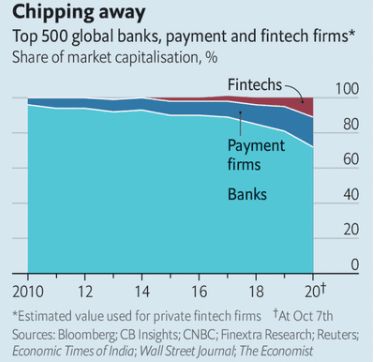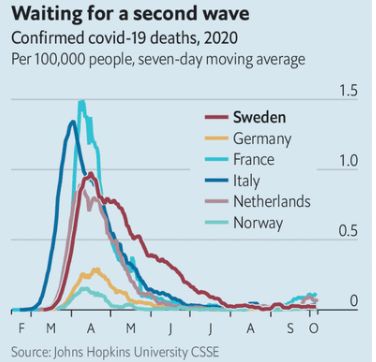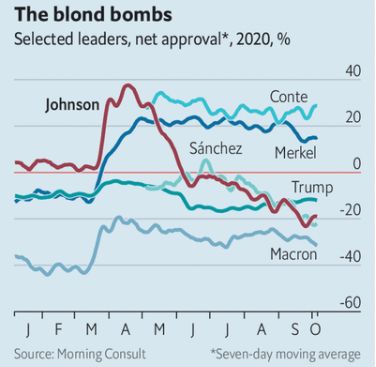In February, the
coronavirus pandemic struck the world economy with the biggest shock since the second
world war. Lockdowns and a slump in consumer spending led to a labor-market
implosion in which the equivalent of nearly 500m full-time jobs disappeared
almost overnight. World trade shuddered as factories shut down, and countries
closed their borders. An even deeper economic catastrophe was avoided thanks
only to unprecedented interventions in financial markets by central banks,
government aid to workers and failing firms, and the expansion of budget
deficits to near-wartime levels.
The crash was
synchronized. As recovery takes place, however, huge gaps between countries'
performance are opening up, which could yet recast the world’s economic order.
According to forecasts by the OECD, America’s economy will be the same size by
the end of next year as it was in 2019, but China’s will be 10% larger. Europe
will still languish beneath its pre-pandemic level of output and could do so
for several years, a fate it may share with Japan, suffering from a demographic
squeeze. It is not just the biggest economic blocs that are growing at
different speeds. According to UBS, a bank, the distribution of growth rates
across 50 economies was at its widest for at least 40 years in the second
quarter of this year.
The variation is the
result of differences between countries. Most important is the spread of the
disease. China has all but stopped it while Europe, and perhaps soon America,
is battling a costly second wave. Over the past week, Paris has closed its bars,
and Madrid has gone into partial lockdown. In China, meanwhile, you can now
down sambuca shots in nightclubs. Another difference is the pre-existing
structure of economies. It is far easier to operate factories under social
distancing than running service-sector businesses that rely on face-to-face
contact. Manufacturing makes up a bigger share of the economy in China than in
any other big country. A third factor is the policy response. This is partly
about size: America has injected more stimulus than Europe, including spending
worth 12% of GDP and a 1.5 percentage point cut in short-term interest rates.
But the policy also includes how governments respond to the structural changes
and creative destruction the pandemic is causing.
As our special
report, this week explains, these adjustments will be immense. The pandemic
will leave economies less globalized, more digitized, and less equal. As they
cut risks in their supply chains and harness automation, manufacturers will
bring production closer to home. As office workers continue to work in their
kitchens and bedrooms for at least part of the week, lower-paid workers who
previously toiled as waiters, cleaners, and sales assistants will need to find
new jobs in the suburbs. Until they do, they could face long spells of
unemployment. In America, permanent job losses are mounting even as the
headline unemployment rate falls (see article).
As more activity
moves online, the business will become more dominated by firms with the most
advanced intellectual property and the biggest repositories of data; this
year’s boom in technology stocks gives a sense of what is coming, as does the
digital surge in the banking industry (see our leader on Ant Group). And low
real interest rates will keep asset prices high even if economies remain weak.
This will widen the gulf between Wall Street and Main Street that emerged after
the global financial crisis, worsening this year. The challenge for democratic
governments will be to adapt to all these changes while maintaining popular
consent for their policies and free markets.
That is not a concern
for China, which so far seems to be emerging from the pandemic strongest—at
least in the short run. Its economy has bounced back quickly. Later this month,
its leaders will agree on a new five-year plan, emphasizing Xi Jinping’s model
of high-tech state capitalism and increasing self-sufficiency. Yet the virus
has exposed longer-term flaws in China’s economic apparatus. It has no safety
net worth the name, and this year, it had to focus its stimulus on firms and
infrastructure investment rather than shoring up household incomes. And in the
long run, its surveillance and state control system, which made brutal
lockdowns possible, is likely to impede the diffuse decision-making and free
movement of people and ideas that sustain innovation and raise living
standards.
Europe is the
laggard. Its response to the pandemic risks ossifying economies there, rather
than letting them adjust. In its five biggest economies, 5% of the labor force
remains on short-work schemes in which the government pays them to await the
return of jobs or hours that may never come back (see article). In Britain, the
proportion is twice as high. Across the continent, suspended bankruptcy rules,
tacit forbearance by banks, and a flood of discretionary state aid risk
prolonging zombie firms' lives that should be allowed to fail. This is all the
more worrying given that, before the crisis, France and Germany were already
embracing an industrial policy that promoted national champions. If Europe sees
the pandemic as a further reason to nurture a cozy relationship between
government and incumbent businesses, its long-term relative decline could
accelerate.
The question-mark is
America. For much of the year, it got the policy balance roughly right. It
provided a more generous safety-net for the jobless and a larger stimulus than
might have been expected in the home of capitalism. Wisely, it also allowed the
labor market to adjust and has shown less inclination than Europe to bail out
firms in danger of becoming obsolete as the economy adjusts. Partly as a
result, unlike Europe, America already sees the creation of many new jobs.
Instead, America’s
weakness is toxic and divided politics. This week President Donald Trump seemed
to ditch talks over renewing its stimulus, meaning that the economy could fall
over a fiscal cliff. Whether to redesign the safety net for a tech-driven economy
or to put deficits on a sustainable course, critical reforms are all but
impossible. At the same time, two warring tribes define compromise as weakness.
Covid-19 is imposing a new economic reality. Every country will be called on to
adapt, but America faces a daunting task. If it is to lead the post-pandemic
world, it will have to reset its politics.
The Pandemic has hit
the world economy with the biggest shock since the second world war. It has
also created big
performance disparities between countries. According to forecasts by the
OECD, America’s economy will be the same size by the end of next year as it was
in 2019, but China’s will be 10% larger. The pandemic will also leave economies
less
globalized, more digitized, and less equal. It is accentuating global trade
imbalances. Its legacies will include even
lower interest rates and even higher asset prices. As the better-off work
on in their kitchens, lower-paid workers may face long spells of unemployment.
In America, permanent
job losses are mounting even as the headline unemployment rate falls, yet
there is a once-in-a-generation surge
in startups. And some existing businesses are booming. Despite a slowdown
in global trade, for example, the
shipping industry is having a banner year.

Another industry
enjoying a COVID-19 bonanza is digital
finance. A new era is dawning: conventional banks now account for only 72%
of the global banking and payments industry's total market value, down from 81%
at the start of the year and 96% a decade ago. Leading the charge against them
globally is Ant
Group, which began life as a payments service on Alibaba, a Chinese
e-commerce giant, but is about to sell shares in the biggest initial public
offering in history, which could value the company at over $300bn, more than
any bank in the world. Ant’s rise worries hawks in the White House and enthralls
global investors. It portends a bigger transformation of how the financial
system works, not just in China but around the world.

Sweden
has become a much-cited example in the debate about how to deal with COVID-19.
Held up as a champion of liberty, it is, in fact, the home
of pragmatism. So its policy is hardly one of the COVID
defiance displayed by President Donald Trump. Nor does Trump’s injunction
not to let the virus dominate people’s lives offer much consolation to the
world’s poor, suffering its consequences. In Latin
America, for example, years of progress in reducing poverty and inequality are
being wiped out. Everywhere, the hope is a vaccine will be available soon. Britain
is already making preparations to inoculate 30m people. Countries differ in
their views of who
should get access to a vaccine first. However, until one arrives, people in
rich countries are getting used to facing up to a
subject many had learned to put to one side: death.

The pandemic is also
damaging perceptions of governments and national leaders, perhaps nowhere more
than in Britain.
In a survey by YouGov, a pollster, of how citizens of 22 countries think their
government has managed the pandemic, Britain bumps along at or near the bottom.
The ratings of the prime minister, Boris Johnson, have plunged in consequence.
Similarly, in Israel,
in indefinite nationwide lockdown, approval of Binyamin Netanyahu, the prime
minister, has handled the pandemic has slumped in polls from 58% in April to
just 27%. It will be scant consolation to the leaders concerned to know that it
is a worldwide trend for people to lose
trust in their governments as citizens gain access to the internet.
The historian Henry
Adams once noted that politics is about the systematic organization of hatreds.
Voters who have lost their jobs, have seen their businesses close, and have
depleted their savings are angry. There is no guarantee that this anger will be
channeled in a productive direction by the current political class, or by the
ones to follow if the politicians in power are voted out. A tide of populist nationalism
often rises when the economy ebbs, so mistrust among the global community
is almost sure to increase. This will speed the decline of multilateralism and
may create a vicious cycle by further lowering future economic prospects. That
is precisely what happened in between the two world wars, when nationalism and
beggar-thy-neighbor policies flourished.
There is no
one-size-fits-all solution to these political and social problems. But one
prudent course of action is to prevent the economic conditions that produced
these pressures from worsening. Officials need to press on with fiscal and
monetary stimulus. And above all, they must refrain from confusing a rebound
for a recovery.
For updates click homepage here